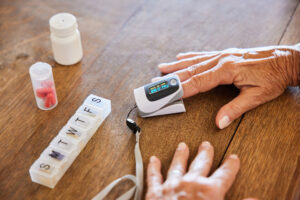Diabetes Management in Senior Living – What to Know

As people age, their bodies change, becoming more susceptible to chronic diseases like diabetes. While there is no cure for diabetes, it can be managed through lifestyle changes, medication, and regular medical care.
For seniors with diabetes, it is vital to have a plan to manage the disease. This may include working with a doctor or other healthcare provider to create a treatment plan, monitoring blood sugar levels, and changing diet and exercise.
Living with diabetes can be challenging, but by working with a healthcare team and following a treatment plan, seniors can manage the disease and enjoy a good quality of life.
Diabetes Management in Long-Term Care
In most senior living communities, the staff is experienced in managing diabetes in elderly residents. According to the American Diabetes Association, one in every four people over 60 has diabetes. The American Geriatric Society recommends that senior living communities provide an individualized care plan for each resident that considers factors such as the senior’s life expectancy, cognitive status, functional status, and social support.
The community healthcare team will use an evaluation tool to assess the senior’s health, the severity of their diabetes, and how much care they will need. A higher assessment score indicates the need for a more intensive diabetic care plan. The seniors’ health will determine the level of care required, the severity of their diabetes, and how much care they will need.
As you compare different communities for your loved one, ask the health care team how they will work with you and your loved one to create a personalized diabetes management plan. This plan should be based on your senior’s lifestyle, preferences, health goals, and other existing health conditions. Considering all these factors, you can be sure your loved one will get the best care.
Blood Sugar Level Monitoring
Tracking blood sugar levels is a crucial way to manage diabetes and keep complications at bay. Maintaining proper blood sugar levels, diabetes can be controlled, and major health problems can be avoided.
The care team will decide if the person can control their blood sugar by testing it themselves and giving them insulin if needed. If not, the care team will have a plan for how to keep blood sugar levels stable. They will also have a plan for giving and tracking medications. These plans usually depend on state rules and what the community can do.
Most assisted living facilities will provide some level of help with taking medications. This may include help with remembering to take drugs, opening containers, or help with administering medications. Some states require a third-party home health service to monitor levels and give insulin, but most communities provide this service through nurses or medical technicians.
The care plan for your loved one with diabetes should include clear instructions on who will be responsible for monitoring blood sugar levels, administering medications (including insulin), and communicating with the resident’s physician.
Meal Plans
Some senior living communities have a dietician or nutritionist who can make special meal plans for seniors with diabetes or other dietary needs. These plans include heart-healthy meals that limit saturated fats, sodium, and portion size.
A dietician often works with a community’s chef or kitchen staff to devise a menu of healthy options for everyone in the community to enjoy. In many cases, communities offer flexible dining schedules and private room service to make it easier for people to stick to a new diet.
Fitness Programs
The American Diabetes Association recommends that people with diabetes exercise for 30 minutes five times a week. They also recommend strength training at least twice a week. Some senior living communities have someone who helps customize fitness programs to meet the needs of individuals. There are often on-site amenities like a fitness center, swimming pool, golf course, or outdoor walking paths to encourage an active lifestyle.
Conclusion
There are a few things to remember regarding diabetes management in senior living. First, working with a healthcare team to develop a personalized plan is important. Second, seniors should focus on healthy eating, physical activity, and blood sugar control. And finally, it’s essential to stay informed and engaged in their care.
Morristown Post Acute Rehabilitation and Nursing Center is a premier nursing home located directly across the street from Morristown Medical Center. Our center is ideally situated to serve as a bridge between hospital and home. We take pride in delivering a comprehensive continuum of clinical excellence imbued with warmth and compassion. If you are looking for a short-term care hospital in Morristown, call us now at 973-946-8658!